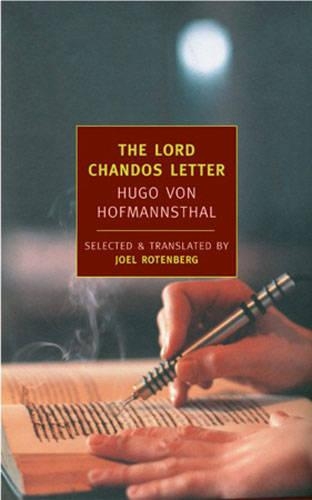
The Lord Chandos Letter
(Paperback, Main)
Publishing Details
The Lord Chandos Letter
By (Author) Hugo Von Hofmannsthal
New York Review Books
NYRB Classics
15th June 2004
11th October 2007
Main
United States
Classifications
General
Non Fiction
833.912
Physical Properties
Paperback
152
Width 127mm, Height 203mm, Spine 11mm
170g
Description
Hugo von Hoffmannsthal made his mark as a poet, as a playwright, and as the librettist for Richard Strauss's greatest operas, but he was no less accomplished as a writer of short, strangely evocative prose works. The atmospheric stories and sketches collected here-fin-de-siecle fairy tales from the Vienna of Klimt and Freud, a number of them never before translated into English-propel the reader into a shadowy world of uncanny fates and secret desires. An aristocrat from Paris in the plague years shares a single night of passion with an unknown woman; a cavalry sergeant meets his double on the battlefield; an orphaned man withdraws from the world with his four servants, each of whom has a mysterious power over his destiny. The most influential of all of Hofmannsthal's writings is the title story, a fictional letter to the English philosopher Francis Bacon in which Lord Chandos explains why he is no longer able to write. The "Letter" not only symbolized Hofmannsthal's own turn away from poetry, it captured the psychological crisis of faith and language which was to define the twentieth century.
Reviews
The dread of the coming dehumanization, the dread of the coming silence of humanity, the dread of human suffering that proclaimed itself everywhere, this precompassion lay deep within Hofmannsthal and made him more poetic than Joyce.
Hermann Broch
The Lord Chandos Letterstates the problem of modern literature with a clarity and audacity which have surely never been surpassed.
Stephen Spender,The New York Times
Author Bio
Hugo von Hofmannsthal (1874-1929), the poet, dramatist, essayist, and librettist, was raised in Vienna. The son of a banker, Hofmannsthal began to publish under the pseudonym Loris when he was only sixteen. Hofmannsthal's youth, talent, and precociousness made a splash at Cafe Griensteidl, the epicenter of literary Vienna; critic Hermann Bahr, in particular, was astounded that someone using the pseudonym of a "well-groomed poodle" and with the figure of a "fine, slender pageboy" could write such brilliant poetry and prose. In the following years Hofmannsthal wrote successful plays and verse influenced by the Symbolist movement. He befriended such critics and writers as Richard Beer-Hofmann, Gerhart Hauptmann, and Stefan George, for whose literary magazine he wrote. A trip to Paris in 1900 introduced him to Maurice Maeterlinck, Auguste Rodin, and Anatole France. Around that time, however, Hofmannsthal turned away from Symbolist poetry; his aesthetic crisis is recorded, in part, in his famous work from 1902, "A Letter" (often referred to in English as "The Lord Chandos Letter"), in which a young nobleman confronts the futility of language. Hofmannsthal began to work almost entirely for the stage and, in 1906, met and began to collaborate with Richard Strauss. Over the next twenty years, he produced librettos for such Strauss operas as Der Rosenkavalier, Ariadne auf Naxos, and Die Frau ohne Schatten. During World War I, Hofmannsthal worked for a propaganda agency of the War Ministry; towards the end of his life, he championed Austrian culture in the hope that art could save Europe from political violence. He died in 1929, days after his oldest son committed suicide. John Banville was born in Wexford, Ireland, in 1945. He is the author of many novels, including The Book of Evidence, The Untouchable, and Eclipse. Banville's novel The Sea was awarded the 2005 Man Booker Prize. On occasion he writes under the pen name Benjamin Black. Joel Rotenberg has produced NYRB original translations for Stefan Zweig's Chess Story and Hugo von Hofmannsthal's The Lord Chandos Letter. His translation of Georg Letham: Physician and Murderer by Ernst Weiss is forthcoming in 2009
